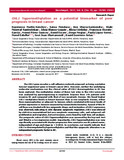Mostrar el registro sencillo del ítem
CHL1 hypermethylation as a potential biomarker of poor prognosis in breast cancer
| dc.creator | Martín Sánchez, Esperanza | es_ES |
| dc.creator | Mendaza Lainez, Saioa | es_ES |
| dc.creator | Ulazia Garmendia, Ane | es_ES |
| dc.creator | Monreal Santesteban, Iñaki | es_ES |
| dc.creator | Blanco Luquin, Idoia | es_ES |
| dc.creator | Córdoba Iturriagagoitia, Alicia | es_ES |
| dc.creator | Vicente García, Francisco | es_ES |
| dc.creator | Pérez Janices, Noemi | es_ES |
| dc.creator | Escors Murugarren, David | es_ES |
| dc.creator | Megías, Diego | es_ES |
| dc.date.accessioned | 2019-01-22T13:34:42Z | |
| dc.date.available | 2019-01-22T13:34:42Z | |
| dc.date.issued | 2017 | |
| dc.identifier.issn | 1949-2553 (Electronic) | |
| dc.identifier.uri | https://hdl.handle.net/2454/32047 | |
| dc.description.abstract | The CHL1 gene encodes a cell-adhesion molecule proposed as being a putative tumour-suppressor gene in breast cancer (BC). However, neither the underlying molecular mechanisms nor the clinical value of CHL1 downregulation in BC has been explored. The methylation status of three CpG sites in the CHL1 promoter was analysed by pyrosequencing in neoplastic biopsies from 142 patients with invasive BC and compared with that of non-neoplastic tissues. We found higher CHL1 methylation levels in breast tumours than in non-neoplastic tissues, either from mammoplasties or adjacent-to-tumour, which correlated with lower levels of protein expression in tumours measured by immunohistochemistry. A panel of five BC cell lines was treated with two epigenetic drugs, and restoration of CHL1 expression was observed, indicating in vitro dynamic epigenetic regulation. CHL1 was silenced by shRNA in immortalized but non-neoplastic mammary cells, and enhanced cell proliferation and migration, but not invasion, were found by real-time cell analysis. The prognostic value of CHL1 hypermethylation was assessed by the log-rank test and fitted in a Cox regression model. Importantly, CHL1 hypermethylation was very significantly associated with shorter progression-free survival in our BC patient series, independent of age and stage (p = 0.001). In conclusion, our results indicate that CHL1 is downregulated by hypermethylation and that this epigenetic alteration is an independent prognostic factor in BC. | en |
| dc.description.sponsorship | This work has been funded in competitive calls by the Spanish Institute of Health and FEDER (PI14/00579), the Basque Foundation for Healthcare Research and Innovation (BIO-11-CM-013), La Caixa Foundation (70789) and the Breast Cancer Patients’ Association in Navarra (SARAY). EMS is the recipient of a grant from the Spanish Ministry of Economy and Competitiveness (PTA2015-11895-I); NPJ was the recipient of a predoctoral grant from the Department of Health of the Government of Navarra; DE is funded by a Miguel Servet fellowship from the Spanish Institute of Health. | en |
| dc.format.extent | 13 p. | |
| dc.format.mimetype | application/pdf | en |
| dc.format.mimetype | application/zip | en |
| dc.language.iso | eng | en |
| dc.publisher | Impact Journals | en |
| dc.relation.ispartof | Oncotarget, 2017, Vol. 8, (No. 9), pp: 15789-15801 | en |
| dc.rights | Creative Commons Attribution 3.0 Unported (CC BY 3.0) | en |
| dc.rights.uri | https://creativecommons.org/licenses/by/3.0/ | |
| dc.subject | CHL1 | en |
| dc.subject | DNA methylation | en |
| dc.subject | Breast cancer | en |
| dc.subject | Prognostic biomarker | en |
| dc.title | CHL1 hypermethylation as a potential biomarker of poor prognosis in breast cancer | en |
| dc.type | info:eu-repo/semantics/article | en |
| dc.type | Artículo / Artikulua | es |
| dc.contributor.department | Ciencias de la Salud | es_ES |
| dc.contributor.department | Osasun Zientziak | eu |
| dc.rights.accessRights | info:eu-repo/semantics/openAccess | en |
| dc.rights.accessRights | Acceso abierto / Sarbide irekia | es |
| dc.identifier.doi | 10.18632/oncotarget.15004 | |
| dc.relation.publisherversion | https://doi.org/10.18632/oncotarget.15004 | |
| dc.type.version | info:eu-repo/semantics/publishedVersion | en |
| dc.type.version | Versión publicada / Argitaratu den bertsioa | es |
| dc.contributor.funder | Gobierno de Navarra / Nafarroako Gobernua | es |



